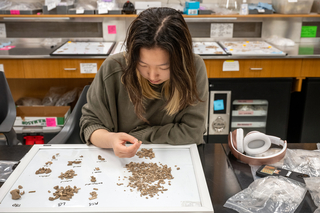At the heart of anthropological practice is the process of posing meaningful questions, planning research, collecting and analyzing data or other materials, and coming up with an original contribution to knowledge. The Department of Anthropology encourages undergraduate students to engage in research in a variety of settings: in their courses, in work as research assistants, and in guided inquiries of their own—often leading to a senior essay. Past student research projects have taken place in international settings, in many parts of the United States—including in New Haven—and in the collections and laboratories at Yale, both in and well beyond the department’s own facilities. In a number of cases, our students have gone on to publish, present, and/or exhibit their innovative anthropological work.
This page offers a set of resources for undergraduates wishing to pursue research in anthropology, whether or not they are declared anthropology majors. Students should also spend some time familiarizing themselves with general undergraduate research resources, as no single listing can capture the full spread of research possibilities in such a wide-ranging field as Anthropology.
Courses
Although many courses include a component of research, some of our regular undergraduate offerings are specifically designed to introduce students to the methods, ethics, and practice of research in Anthropology. These courses may be particularly useful for students planning senior essays.
3720 Field Methods in Cultural Anthropology
3116L Introduction to Archaeological Lab Sciences
3476-7 Observing and Measuring Behavior, I and II
3594-5 Methods and Research in Molecular Anthropology, I and II
4834 Anthro-History: Interdisciplinary Theory and Methods
4154 Statistics for Archaeological Analysis
Methods courses in other departments may also be highly relevant and useful.
Working as a Research Assistant
Some faculty in Anthropology employ undergraduate research assistants in a variety of capacities. If you are interested in this possibility, consider speaking to your professor after class or consult with the DUS.
Independent Research
The Anthropology Department offers a wide variety of possibilities for senior work. Students contemplating significant independent research leading to a senior essay should consult with the DUS and/or a potential adviser well in advance of their senior year to take advantage of the fullest set of options. Junior year study abroad that includes a research component, a summer field school, or summer independent research, for instance, require significant advance planning. The following resources may also be of help.
Suggestions for Funding Sources
Declared majors in Anthropology who wish complete research relevant to their senior essay are eligible for a one-time small grant of up to $350 to cover costs related to materials, travel, and other expenses related to their thesis project. Seniors and second semester juniors planning summer or in-semester research in all areas of Anthropology, except for archaeology, are encouraged to apply. (Archaeology students are encouraged to take advantage of the Albers and Coe Funds; see below). To apply, students must be working with a senior thesis advisor and should propose a well-conceived research project with a modest budget. In consultation with the thesis advisor, students write up a single-page proposal that includes a brief thesis description, proposed activities, timeline, and itemized budget which is then approved by their advisor. The proposal should be emailed to the DUS, who will review it in consultation with one other faculty member. If approved, students will receive their funds quickly. At present, funding is sufficient to support all approved applications and proposals will be accepted on rolling basis.
In addition, the Anthropology Department is fortunate to be able to offer a number of grants to support attendance at archaeological field schools through Albers and Coe Fellowships. Check here for information on international field schools and archaeological projects.
Many of our students combine research projects with a semester abroad. Although most study abroad programs are not explicitly designed for supporting research, a research component can often be added in consultation with a faculty adviser. Read more about study abroad opportunities at Yale.
In addition to the above sources, College Deans are wonderful sources of information about little known programs and resources.
See this page for additional suggestions for Funding Sources at Yale.
Practicalities
Students should consult with their advisers about what kind of training, advance review, and/or other preparation is necessary to carry out the research they are planning. Useful resources include the following:
